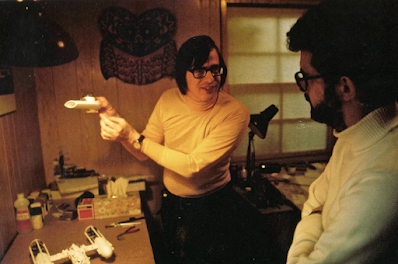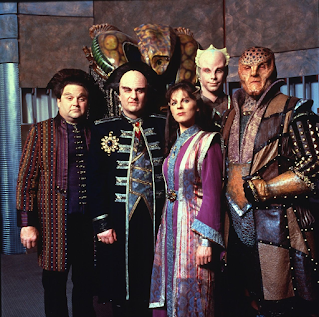Cloud Strife, mercenary for hire, is contacted by his childhood friend Tifa to help out an ecological resistance group she's part of, AVALANCHE, which is resisting the despoiling of the planet by the Shinra Company. Cloud joins up for the money, not the cause, but almost against his will he's drawn into their struggle, especially when his old superior officer turned enemy Sephiroth shows up. As a three-way battle for the fate of the planet takes shape, Cloud must overcome his own demons and devastating losses to preserve the planet.
Two years ago, Square Enix released Final Fantasy VII Remake, the first part of a series of games updating their classic 1997 roleplaying game to modern standards. The game was pretty good (some quibbles aside), but it only adapt the first part of the game. The second part still doesn't have a release date and any further parts (if needed) will be years after even that. Of course, one cunning way to get around this is to just replay the original game.
Final Fantasy VII is regarded as one of the most important video games ever made. A huge unit-shifter for the original Sony PlayStation console, it demonstrated the console's graphical capabilities (through enormously impressive CGI cutscenes) whilst retaining the depth of gameplay and customisation that the series had previously become famous for on the NES and SNES. The game's story, characters and shock plot twists became iconic, and the game arguably did more for popularising Japanese RPGs outside of Japan then any game before or since. Its anime stylings also helped the burgeoning popularity of manga and anime in other countries.

The game could also be famously obtuse: it was one of the biggest-selling video games on the original PlayStation but it was also one of the most heavily-resold, with as many players bouncing off its confusing storyline and poorly-translated characters as those who loved and embraced it. A lot of players in 1997 (and 1998, when it first hit PC) really got into FF7 because there were not too many exciting alternatives around, whilst that is definitely not true in 2022, where even its own sequels are more approachable (Final Fantasy IX, which uses the same engine, has many of FF7's strengths and fewer of its weaknesses, for example).
That said, Final Fantasy VII still has a lot to offer and as a classic of the genre, it's definitely worth a look. Whether players will stick with it is another matter.
FF7 sees you controlling a party of three characters at any one time, drawn from a wider pool that can grow to nine characters (two of whom are optional and can be missed if you're not careful). Each character has their own distinct personality and specialisations, but a key selling point of FF7 is its deep customisability: you can rename every character and you can tailor characters' growth how you want. Tifa may be presented as a melee specialist, but if you want to pour magic upgrades into her and turn her into a formidable spellcaster, there's nothing stopping you. Compared to the class systems from prior Final Fantasy games (and most other fantasy CRPGs), this is tremendously freeing. Most characters also work as solid jack-of-all-trades, with great combat and magic skills.

The game's magic system remains superb. Magic is used in the form of crystals called materia. Materia can be assigned to weapons and armour, granting the wielder access to their associated spells but also giving them bonuses. There is a colossal amount of materia which can do everything from healing to hurling fire to learning enemy skills to granting support abilities, like your character will immediately automatically counter-attack enemy strikes, or when asked to use a spell once will instead cast it four times. Towards the end of the game, the type and applicability of materia can get completely crazy, in a pleasing, almost game-breaking kind of way. The materia system remains brilliant, and fun to play around with and experiment with different character builds. As you use materia, it also levels up, unlocking new spells or new tiers of existing spells. You can also level up materia and then give it to another character to use, or sell at a huge profit.
You also have weapon and armour upgrades, acquired at a steady pace through gameplay or bought at stores. Each weapon and armour has a different amount of materia slots, and these don't always scale linearly: the best weapons in the game don't permit any materia growth, so are best held back for the final battles in the game. Some formidable weapons don't allow you to use any materia at all but have massive damage bonuses, and so on. The weapon and armour system is less extensive than the materia one, but adds a nice amount of added depth to the game.
In terms of gameplay, the game runs in three different modes. For most of the game you control a party of three (usually led by Cloud) who run around on painted backdrops. In this mode the game controls like an old adventure game like Grim Fandango, or a faster-paced Resident Evil. You can search for treasure chests, talk to other characters, go into shops or just make your way to the next destination. The hand-painted backdrops are gorgeous but, in their original format, very low-res and somewhat confusing. Various mods have remastered the painted backdrops via AI with varying degrees of success, but have improved matters.
In the second mode, you have access to the world map, a 3D representation of the entire planet which you can run your party around on either on foot or by vehicle (buggy, a plane converted into a boat, a submarine and, later, an airship). You are mostly directed to the next destination required by the story, but later in the game you can travel across the map freely to carry out side-quests, find obscure loot and fight optional enemies.

In both modes (apart from when in cities or other "safe areas") you can get into combat at absolutely any moment. You can't see enemies before they attack, and it's a bit disconcerting by modern standards to be wandering around an empty screen and suddenly combat kicks in with its very jarring (but excellent) music. Combat is semi turn-based, with timers that rise for both sides before you can act. You can speed up these timers with certain hasting spells and abilities, whilst enemies can slow them down with magic. During combat you can attack with your default weapon, use magic or use an item. Combat can be satisfyingly tactical, with you having to strike a balance between attack, using defensive magic (to put up shields to reduce physical or magical damage from heavy-hitting enemies, for example) or using items to heal the party or wake up KOed allies. Just following the story will give you plenty of combat and opportunities to improve your skills, but you can also grind areas to level up faster.
Of course, you need a good reason to do all of this, and Final Fantasy VII delivers an excellent, if unoriginal, premise. It's basically Star Wars with the evil Shinra Corporation (the Empire) despoiling the planet and ruling with a tyrannical fist, and AVALANCHE (the Rebels) are out to stop them. There is a wild card in the form of a second enemy, Sephiroth, who looks amazing and has cool hair but ends up being a bit under-cooked as an enemy compared to the numerous faces of Shinra. The good guys are an iconic if archetypal bunch, from brooding soldier Cloud to sunny-optimistic Aerith to tough guy Barrett. The characters are great, but they are severely under-developed compared to modern game protagonists, with a relative lack of dialogue and background depth apart from Cloud, Tifa and Aerith. Still, they're fun if shallow.
Where the game does falter is how it tells its story to the player. The opening, with AVALANCHE mid-operation and the player joining in media res and having to quickly get up to speed, is rightfully iconic, showcasing the game's unusual steampunk-meets-fantasy-meets-modern-day world and throwing up some good action sequences. However, it doesn't take long for players to run into the game's famously iffy translation issues. The game was translated from Japanese into English quickly and a bit too cheaply, resulting in confused dialogue and head-scratching moments that don't make much sense. This is not entirely helped by the game undergoing some changes via different editions over the years and the dialogue not keeping up (Weapon is referred to as a single enemy, for example, whilst the international version of the game expands this enemy to five different entities). You always get the general gist of what's going on, but occasionally opening the game's wiki entry to find out what is actually going on can be quite helpful. Particularly irritating are a couple of moments mid-game when the very clear objectives you've had on what to do next dry up and the game leaves you to wander the world map until bumping into the next objective, which can take a long time without consulting a walkthrough.
The game also has little truck with a lot of UI standbys that were becoming standard at the time, let alone now. There is no autosave, so you have to manually save every chance you get (something even its near-contemporary, Baldur's Gate, did for the player). This is not helped by the fact you can only save at certain points or on the world map, not everywhere, which can occasionally put you in difficulty spikes where you can die and then have to retrace the last ten minutes or so. FF7 is not a really hard game by any standards, especially the occasionally crippling standards of some JRPGs, but it can catch you out if you don't stay on top of upgrading your weapons and materia.
The game also has a lot of systems which it doesn't really explain to you, again leaving you consult online guides. Particularly undersold is how incredibly powerful the Enemy Skill materia is (allowing you to use enemy abilities once they've been used on you), and the game doesn't tell you which enemy skills can be learned and which cannot, again encouraging the use of outside help.
These negatives, jank and dated systems will no doubt be more aggravating for newer players than for seasoned veterans. But there is a lot to enjoy with the original Final Fantasy VII (****). Its relatively fast pace, especially compared to its drawn-out remake, is refreshing and keeps the game ticking over breezily for all of its 35-40 hour length (considerably more if you grind your characters to maximum level or try to fight some of the optional bosses). The iffy translation can mostly be overcome and the three-way fight between AVALANCHE, Shinra and Sephiroth becomes quite intriguing, with numerous betrayals and unexpected alliances. Enhanced with mods, the game can also still look quite amazing, considering it's now (screams) a quarter of a century old, whilst the soundtrack remains one of the best in gaming history. The combat depth is also still remarkable, and the magic system one of the best ever seen in a CRPG.
Final Fantasy VII is available on PlayStation, Android, Xbox and Nintendo systems, as well as on PC via GoG and Steam. For this replay I used the SYW Mod, which uses AI to upscale both the FMV video and painted backgrounds in the game, and is still being updated and supported. The results can be variable, but in most cases the background art was hugely improved and made clearer, although the FMV was more hit-and-miss and could occasionally get a little smeary. Other mods are available, such as Remako which is no longer supported but gives a better finish to the FMV and backgrounds but the 3D models and combat is not as enhanced.




















